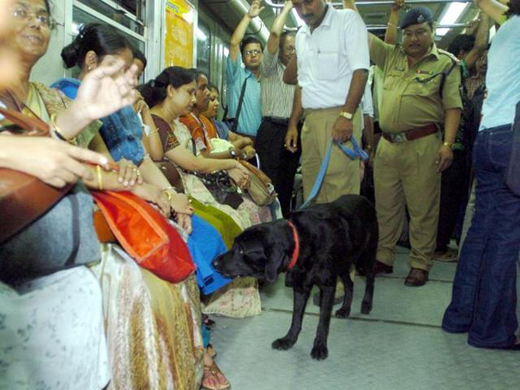Vulnerable to terror threats, Kolkata metro a daily risk for commuters
Mangalore Today News Network
Kolkata, Aug 05, 2016: Entering Masterda Surya Sen station in south Kolkata without undergoing security checks is easy.

The X-ray machine does not work, and has been lying covered for about a month. At 10.15 am on Wednesday (July 13), three men in khaki sat beside it, equipped with two hand-held metal detectors, engrossed in chatting among themselves. It was entirely voluntary for the commuters to get their bags checked—and to pass through just ahead of the door-frame metal detector (DFMD).
In short, the country’s oldest metro is a sitting duck.
To add to the infrastructural inadequacies, even the existing mechanism to apprehend terrorists lies underutilised due to a casual approach by the security personnel. The personnel posted at the stations, too, have few sophisticated weapons to deal with attackers before reinforcement arrives.
The unprofessionalism of guards at Masterda Surya Sen station was caught in HT’s camera a week after the RPF conducted a Suraksha Sammelan to review the security arrangements and issued directives for the security staff to ‘remain on the maximum alert’.
This correspondent captured the scene at Masterda Surya Sen station in a video despite a prohibition on photography and videography. Operating since the start of the Kolkata Metro 1984, its 27-km stretch is the city’s lifeline, carrying five lakh passengers every day.
“The security arrangement at metro stations is full of loopholes. The metro rail is unprepared to combat a terror attack,” said Bikash Kumar Chattopadhyay, former assistant commissioner of Kolkata police, who is a daily commuter on metro rail.
During his career as an officer in Kolkata police, Chattopadhyay had investigated the 1993 Bowbazar blast and the American Centre attack of in 2002. A 2013 awardee of the President’s Police Medal for Distinguished Service, he accompanied Team HT to the station to assess the loopholes.
- Special train between Indore and Mangaluru to clear festive rush
- Land owners demand denotification of lands notified for highway widening in Padua village
- Daiva ritual linked to Rishab Shetty’s vow conducted as per tradition, shrine committee clarifies
- Mangaluru: Youth found dead by hanging at Padil
- Vande Bharat Express likely from Bengaluru to Mangaluru, Udupi and Karwar
- Kasaragod: Local body election results to be announced today
- Udupi: Skeletal remains of unidentified man found in Ambalpady
- Uppinangady: Wild elephants destroy crops in Bajathoor village
- Sullia youth killed in hit-and-run in Mysuru
- Union Cabinet announces Census 2027, to be held in two phases
- Mangaluru: Illegal cattle slaughter continues, three carcasses found near riverbank
- Hejmady Kodi fishing harbour project sees 87% progress, says Union Minister quoting Karnataka government
- Belthangady: Shop owner booked under POCSO for sexual harassment of minor girl
- Ex-Air Force officer arrested in Assam on charges of spying for Pakistan
- 2001 Parliament attack anniversary: PM Modi, Rahul Gandhi pay tribute to fallen heroes
- Lionel Messi’s blink and Miss Kolkata event angers fans, bottles thrown
- 3 US lawmakers move resolution to end President Trump’s 50% tariffs on India
- Bengaluru man electrocuted while trying to save pet parrot worth 2.5 lakhs
- Red fort blast: Delhi court sends 3 doctors, preacher to 12 days jail
- Samajwadi to Majawadi: BJP slams Siddaramaiah on flight travel expenses
- IndiGo crisis: DGCA suspends 4 Flight Operations Inspectors
- Former Lok Sabha Speaker Shivraj Patil dies At 90
- Indian artefacts among 600 high value items stolen from UK museum
- Andhra bus with devotees crashes into ravine due to heavy fog, 9 dead
- IndiGo offers travel vouchers worth Rs 10,000 to passengers severely impacted during Dec 3-5
- Mangaluru Student Goes Missing; Ullal Police Register Case
- APD Foundation Joins WHO Civil Society Commission
- Daiva’s prediction comes true: Janardhan Reddy walks free from jail
- Skills and Competencies Take Center Stage at MSN Dialogue Series
- Court remands Maoist Lakshmi to six-day police custody
- Sandhya Shenoy honored with Society for Materials Chemistry Medal-2024
- White Cornus Apartment in Mangaluru
- City girl wins first place in state-level spell bee competition
- Alleged ‘Love Jihad’ Case in Mangaluru: Woman left home voluntarily, says police
- Girl fatally struck by reckless two-wheeler near Belman
- New residential complex for the judges inaugurated in Mangaluru
- Absconding accused nabbed after 8 years
- Truck with cylinders turns turtle in Beltangady
- Bhoota Kola artist dies of cardiac arrest
- Development of the country should be our goal: Ganesh Karnik
- CITY INFORMATION
- TRAVEL
- TOURIST INFORMATION
- HEALTH CARE
- MISCELLANEOUS




 Write Comment
Write Comment E-Mail To a Friend
E-Mail To a Friend Facebook
Facebook Twitter
Twitter  Print
Print 

